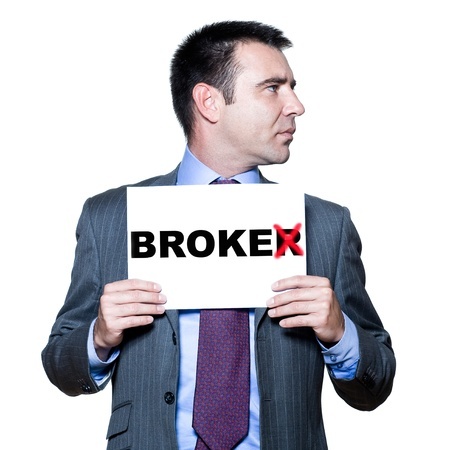Articles by John Tucker
The Telephone Is The Broker’s Best Friend
November 9, 2015 As we enter the second week of November 2015, we are indeed continuing the Year of The Broker, which I believe will not end on Thursday, December 31st at 11:59 p.m., but instead will continue into the year of 2016. As a result, I plan on remaining right here with deBanked to continue the Year of The Broker discussion throughout the entire year of 2016. The mass entrants of new brokers into our space will surely not slow down any time soon, even though only a small percentage of new brokers will actually have some sort of career longevity. For these mass new entrants, they will surely have available a number of different Marketing mediums, but only one (in my opinion) might serve to be the most efficient considering time, costs, access and productivity.
As we enter the second week of November 2015, we are indeed continuing the Year of The Broker, which I believe will not end on Thursday, December 31st at 11:59 p.m., but instead will continue into the year of 2016. As a result, I plan on remaining right here with deBanked to continue the Year of The Broker discussion throughout the entire year of 2016. The mass entrants of new brokers into our space will surely not slow down any time soon, even though only a small percentage of new brokers will actually have some sort of career longevity. For these mass new entrants, they will surely have available a number of different Marketing mediums, but only one (in my opinion) might serve to be the most efficient considering time, costs, access and productivity.
#1.) Indirect Marketing Mediums
– Strategic Partnerships: Will be difficult to establish for new entrants due to established players already having agreements and integrations in place with a lot of the main players. Strategic Partnerships include organizations such as Banks, Credit Unions, Associations, Merchant Processors, etc.
– Mom and Pop Network: Will be difficult to establish for new entrants as there’s only so many sub-agents that could exist at any given time, and they usually (by this point) have already built up close relationships with their Funder Networks and larger Brokerage Houses.
– Indirect Ads and SEO: Will be difficult to establish for new entrants due to the high marketing costs and lower percentage of quality leads that are generated. The fact is that this medium attracts a ton of companies that won’t even qualify for our product, such as a lot of start-ups. Plus established players have pretty much already sealed quality positions and placements with high marketing budgets.
#2.) Direct
– The Mail: Won’t work for most new entrants due to the high cost of postage and packaging. In combination with the low response and conversion rates, for many this medium might not be profitable.
– Email: Only works after speaking with a client and serves as a good form of follow-up, but not good for initial contact as the emails will usually be filtered off as “spam” and one should be very mindful of national and state spam laws in relation to using this medium.
– Fax: Only works after speaking with a client and serves as a good form of follow-up, but not good for initial contact because the medium for initial contact is illegal.
– In-Person: Works decent, however with high gas costs, traffic jams, and other inefficiencies, this should not be used for initial contact, but can be used in conjunction with the Telephone.
……And speaking of the Telephone…….
The Telephone is going to be the most efficient medium used by new entrants and smaller broker shops today due to the following:
- Ease of Access: All one needs is a web based Predictive Dialer from the likes of a CallFire, YTel or Five9.
- Cost and Structure Efficiency: You can pay by the hour usage or pay a flat monthly fee for an unlimited monthly call volume. By the dialer being web-based, there are no IT specifications that you have to control on a daily basis.
- It’s Still Legal For B2B: It’s illegal for B2C in terms of the initial contact, but as of right now, it’s still legal for initial contact on the B2B side.
- Mass Productivity: It’s a great medium where one can work a 10 hour day from 9:00 a.m. to 7:00 p.m. EST, covering the East, Central, Mountain and West coast time zones. Over the course of these 10 hours, one can complete about 40 – 80 meetings with decision makers, as well as leave about 200 – 250 messages for said decision makers with employees or via voicemail.
Telephone Conversion Analytics
Over my time of directly selling both the merchant cash advance and alternative business loan products, I’ve found the following conversion analytics to be in place for new deals, and the following can assist you with your ROI planning:
- For every 15 decision makers that you speak to on a cold call, you should get 1 interested lead, or let’s say a conversion of 6.7% to leads. For a clear definition of a lead, refer to a prior deBanked article of mine here. Calling SIC generic listings can be considered a “cold call”.
- For every 15 decision makers that you speak to on a warm call, you should get 5 interested leads, or let’s say a conversion of 33% to leads. Calling UCCs can be considered a “warm call”.
- For every 15 leads, you should get 3 completed application packages, or let’s say a conversion of 20%. A complete package includes the application and 3 – 6 months of bank statements.
- With an efficiently constructed Funder Network based on Paper Grades of 1-2 Funders for A+, A, B/C, and C/D, you should be getting approved files of about 40%, with a closing ratio of 30%.
Final Word
What will happen if B2B Telemarketing becomes illegal for initial contact just as B2C Telemarketing currently is? Would that likely be the final death blow to new brokers and smaller broker shops in terms of their ability to market efficiently and profitably?
I’m not sure, but as of right now, it’s the most efficient form of Marketing medium for new broker entrants and small broker offices. If it were to ever be taken away (become illegal), I think it might be much harder (if not impossible) for smaller broker shops to survive.
Brokers: It’s Okay To Be A Piker
November 5, 2015The Financial Services Industry is famous for coming up with different connotations that are outside of the comprehension level of the general public. Such connotation listings include terms such as: Derivatives, EPS, Diluted EPS, SPO, EBITA, Par Value, among others.
But there’s one word that I wanted to discuss in particular that comes off as a form of “slang” within the Industry, and that’s the word Piker. To be called a piker by someone in our industry, is to be called a person that thinks small, reaches for small goals and doesn’t dream big.
 MASS NEW BROKER ENTRANTS HAVE BIG DREAMS
MASS NEW BROKER ENTRANTS HAVE BIG DREAMS
The Merchant Cash Advance Industry is in a major bubble right now, with a large quantity of new broker entrants into the market all with big dreams inspired by the myriad of industry recruiting ads, highlighting that with little-to-no experience, you can jump in and make $20k a month. The “rah rah” sales motivational speeches soon follow with examples on how one guy is making $25k per month, how another guy just sold his MCA firm and cashed out for $5 million, how another guy made $1 million last year alone, and how YOU can do all of this too if you just come on in and start dialing!
So the big dreamers begin to dream……
- “This year I’m what Dave Ramsey calls a Whopper Flopper. I hate working in this crappy Burger King drive-thru, it’s time to start making my dreams come true.”
- “Next year, I will be making $20,000 a month and driving around in a Mercedes-Benz S-Class.”
The guy joins the new rolls of rookie/new broker entrants on web based predictive dialers calling merchants about a “UCC” they filed 3- 12 months ago. He will start out with about 150 merchants to call on Monday about this UCC filing, and by the time he calls those merchants on Monday, they would have already been called by 15 – 30 other companies over the previous two weeks alone.
In other words, they will all slam the telephone down in his face after he literally mentions the fact that he’s calling from any “capital or funding” company, without him even being able to get a word in.
 DREAM KILLED (REALITY SETS IN)
DREAM KILLED (REALITY SETS IN)
The reality is that success in our industry is mainly due to leveraged resources, rather than actual superior “selling” capabilities. What happens is that 20% of the brokers in the market remain profitable and sustain a good career/operations going forward, where as 80% of brokers don’t last more than 3 – 6 months, mainly because the 20% has access to resources that the other 80% don’t have access to, that provides them a significant market competitive advantage. These resources include:
- Having Strategic Partnerships with Banks, Credit Unions, Processors and Other Associations
- Having Access To Financing (Debt and Equity) Allowing For A Much Higher Marketing Budget
- Having Access To Better Base Pricing
- Having Access To Better Quality Data
- Having Access To Better SEO Positioning
- Having Access To Better Marketing Channels
Mr. New Broker, you were hired to be a part of what I call The Mom and Pop Network, which is just a group of random brokers who will resell for free (you pay for all of your expenses). So they might maintain a Mom and Pop Network of 2,000 brokers that bring in on average of 10 applications a year (20,000 apps) with 35% getting approved (7,000) and 30% closing (2,100) with an average funding per client of $30,000. This is $63 million in annual funding volume for the firm from this source alone.
A DIFFERENT APPROACH: THE PIKER APPROACH
So Mr. New Broker, how about instead of following the “rah rah” sales crowd, how about you join me over here on the Piker side and we set some goals on being solidly in the middle class instead?
- Going based on individual income, you are considered middle class in the US for the most part if from staying in an low/average cost of living area, you make over $40k a year (lower middle class), $50k – $60k a year (the middle of the middle class) or $70k – $85k (higher middle class).
- $50k – $60k a year in a low cost of living area will still allow you to live in a great quality Suburb, if you strategically manage your expenses with efficient budgeting and tax reduction strategies.
- You also want to be putting away let’s say $7,500 a year into your retirement/investment accounts. If you do this for 40 years from 25 – 65, with just a conservative 5% per year return, you will have over $1 million at age 65. At 65 you could put that $1 million principal into a long term CD paying let’s say 3% per year, opt to receive the interest every month, and get $30,000 a year. Then when you add in your Social Security payments of let’s say $20,000 a year, this now gives you $50,000 a year in spending power without even touching the $1 million principal.
IMPLEMENTING THE PIKER APPROACH
The first thing you want to do is make sure you stay in a low cost of living area, so if you are in a high cost of living area like NYC or LA, I would move immediately. Secondly, you would setup your virtual office (in the cloud) to include your telephone line, fax line, website, etc. Thirdly, you want to focus on doing market research on various market niche challenges where you can come in and creatively solve outstanding problems, for example, you might do some of the following:
- Find new solutions for niche industries that don’t qualify for most MCAs, but would like an MCA.
- Find new solutions for start-up companies seeking working capital.
- Analyze big data sources to find merchants in particular situations that you could address.
Map out a complete strategic business plan with sales forecast estimates, ROI estimates, and partner with companies that have the infrastructure to help deliver the solutions you laid out. Keep your credit clean and use No Interest Credit Card Promo Deals to creatively finance your marketing efforts.
FINAL WORD – AM I DREAMING TOO SMALL?
Am I dreaming too small? Shouldn’t I be up all night focused on how to be the next CAN Capital?
My issue with the “rah rah” sales speech is that they preach from the TOP of the ladder in terms of the extravagant income estimates ( $250k – $1 million per year), without providing any information to New Brokers on actual strategies, competencies, networks, and resources needed to ACTUALLY amass such levels of annual income. It doesn’t make any sense.
So my advice for all New Brokers is to be a PIKER, which is to establish yourself solidly in the middle class first, then once that’s done, you can look at ways to expand on your competencies, resources and networks to grow into the six figure income range.
Leads vs. Data: Do You Know What You’re Buying?
October 11, 2015 One important aspect of being a broker is your ability to generate qualified leads. At the core of a broker’s business, he/she is really just a lead generator for their network of funders, functioning as a way to improve their funder’s profitability through the acquisition of new clientele.
One important aspect of being a broker is your ability to generate qualified leads. At the core of a broker’s business, he/she is really just a lead generator for their network of funders, functioning as a way to improve their funder’s profitability through the acquisition of new clientele.
While I once questioned if brokers truly knew what they were selling when it came to the merchant cash advance product, my next question is in relation to the purchase of what vendors refer to as “Leads.” I want to know, do you (as a broker) know what you’re buying?
While it’s apparent that you can produce qualified leads internally, can you truly produce the same externally? With the various companies that pop up (seemingly overnight) without domain names, without professionally designed websites or with just the use of a Gmail/Yahoo Email Address, can you truly trust the claims that most of them make in terms of their ability to sell you qualified leads? Maybe so, maybe not, but I believe if we begin with the proper connotation of a “lead” vs. a “data record”, then it might help to truly determine what you’re purchasing from these external sources.
WHAT IS DATA?
Data is business intelligence, which is either generic or specialized information on a business or a group of businesses that are within a sales professional’s generic target market. It would be up to the sales professional to take this data, turn it into a sales pipeline (leads), convert a percentage of those pipeline listings into application submissions, and a portion of those applications into funded deals. Data can come in the form of generic listings such as those from the Yellow Pages or specialized listings such as those from court houses, financing requests and UCC records.
So for example, a UCC record is a data record, not a lead. You would buy let’s say 2,000 UCC records and after running through them via a predictive dialer internally, you might filter off 130 interested prospects which creates your sales pipeline, which is what you would now call “leads.” Then through following up on those 130 interested prospects, you might convert let’s say 20 – 30 of them into application submissions and fund 6 – 9 of them.
WHAT IS A LEAD?
A lead is an actual interested prospect in the services/products that you specifically have to offer. This means they have seen your specific ad or marketing piece, and have specifically expressed interest in what you have to offer. These can only be generated in-house through:
- Running through Data Records as explained above.
- Using other forms of direct marketing such as mailers, email marketing and through directly contracted referral sources who resell your product/company.
- Using indirect marketing options such as banner ads, radio ads, TV ads, print ads, billboard ads, SEO related concepts, and Pay-Per-Click, where the prospect will see or hear the ad and respond to you directly through filling out a form, giving you a call, shooting you an email, etc.
I firmly do not believe you can purchase Leads externally, I believe they can only be generated in-house using direct or in-direct marketing procedures listed above.
 HOW TO ADDRESS LEAD GENERATION COMPANIES?
HOW TO ADDRESS LEAD GENERATION COMPANIES?
So when a company comes to you selling “leads,” you should ask them are they selling “leads” or are they selling “data” records? Because they can only be selling YOU leads if they have specifically marketed your specific company and products to said generic target market, and generated interested parties to your specific company and products.
So what about companies that generate what they deem to be “leads” for the “service” that you offer in a generic fashion? For example, people that sell insurance would see people selling insurance Leads, people that sell equipment leasing will see people selling equipment leasing leads, and of course people that sell merchant cash advance will see people selling merchant cash advance leads.
I am still of the belief that these are not leads, but data records, it’s just a different type of data record similar to that of a UCC. A UCC is a more specialized type of data record that tells you more in-depth information on the current situation of the prospect in particular, such as the fact that they took out a cash advance on XYZ date with XYZ funder. This is more specialization than let’s just say a basic Yellow Pages listing, which just has the company’s name, address and telephone number. But both the UCC record and the Yellow Pages listing are still data records.
The “product specific leads” that are sold are usually just a listing of individuals who filled out various online forms requesting some type of particular product, service or financing vehicle. In my opinion, these are not leads, but still data records that will list only the generic information on the company and the date/time they requested more information “generically” on the product or service in particular.
You (as the broker) still have to call these leads and sell them on your company, your product, your pricing, your platform, etc. This means similar to UCC records, if you get 2,000 of these records, you might only convert 130 to interested prospects, which would now be the official “leads.” Then of course from there through following up on those 130 interested prospects, you might convert let’s say 20 – 30 of them into application submissions and fund 6 – 9 of them.
 HOPEFULLY NO ONE IS OFFENDED
HOPEFULLY NO ONE IS OFFENDED
This article might offend some individuals who are in the “Lead Generation” business, but I explicitly want to state that my intention is not to cause distress. I firmly believe that the vast majority of the time, when one is purchasing “leads” from an external source, they are indeed only purchasing data records. As a result, such disclosure should be made and such pricing structures modified.
The purpose of this article is so that brokers can know what they are purchasing ahead of time, to make sure that the price they’re paying fits their ROI analysis.
The last thing any vendor would want (in my opinion) is to have a bunch of angry online reviews from brokers who paid $3.00 a piece for your 2,000 “leads,” that only converted to 130 truly interested parties, and then only produced 20 – 30 completed application submissions.
Mr. Merchant: Help ME, Help YOU
September 25, 2015 As we close the 3rd Quarter in the Year Of The Broker, I thought that it might be imperative to blow off some steam. Industry forums, commentators and media reporters often rant on Brokers and Lenders by disclosing the inefficiencies of such parties. But I have yet to see (or hear) of anyone making a particular “rant” on the most crucial element in our industry, The Merchant. So if you would allow me the liberty to do so, I would like to take a couple of moments to provide these rants as many of you might have the same “pet peeves” with the merchants you are currently assisting (or trying to assist).
As we close the 3rd Quarter in the Year Of The Broker, I thought that it might be imperative to blow off some steam. Industry forums, commentators and media reporters often rant on Brokers and Lenders by disclosing the inefficiencies of such parties. But I have yet to see (or hear) of anyone making a particular “rant” on the most crucial element in our industry, The Merchant. So if you would allow me the liberty to do so, I would like to take a couple of moments to provide these rants as many of you might have the same “pet peeves” with the merchants you are currently assisting (or trying to assist).
Help ME, Help YOU
Mr. Merchant please Help ME, Help YOU. We all know the situation of why you returned my call, email, etc., you are in need of some working capital for your business because conventional sources are either not lending to you altogether, or they can’t work within the time frame that you need the capital in.
But I can’t help YOU, unless you first help ME in the process by being as efficient as you can in terms of your level of organization. You operate a $350k – upwards to $10 million business, why is it that you are so unorganized to the point where you can’t seemingly tell your head from your rear? Below are just “some” of things that Mr. Merchant, YOU need to work on.
Not Meeting Basic (Elementary) Deadlines
We would be at the very end of the closing process only for you to send over an expired driver’s license because you never updated it, or your SOS filing is inactive because you didn’t pay the $50 annual filing fee, or you are late filing your taxes and didn’t put in an extension. These are basic (elementary) deadlines Mr. Merchant, how is it that you are not staying on top of them?
Bank Statements Are Out Of Order
We need your bank statements to analyze your sales, cashflow, balances, etc. to determine approval terms/conditions. Why is it that your fax has pages that are totally out of order, pages missing, etc.? Why is it that many times you don’t even know where your bank statements are and we have to wait 3 or 5 days for you to “find” them? We are in the Year of 2015 Mr. Merchant, have ever heard of a tool called “Online Banking”? You can easily log in and forward your statements over in PDF format by email within 5 minutes.
Can’t Find Financials
So Mr. Merchant, you are requesting $200,000 plus from my platform and the Underwriter needs to take a look at last year’s Tax Return, Prior Year Financials and YTD Financials. But similar to your Bank Statements, you have no clue where these documents are. Mr. Merchant, how can you run a $5 million plus business, but not know where your Company’s Financials are?
 Bad Credit
Bad Credit
The average FICO score in the country is about 693, yet Mr. Merchant, your FICO score is under 500, or 520, or 575. As an entrepreneur, you know that you are supposed to keep your credit clean as much as possible, yet you routinely tell me that you haven’t pulled your credit in a while and you don’t know what’s on your report. There are free sources like Credit Karma, Credit Sesame and your Credit Card Issuer to get your credit score/reporting ranges for free, yet you don’t use them?
Running The Business On Overdraft Protection
Mr. Merchant, my financing is based on a daily or weekly fixed payment, how can I approve you when you have no money in your business bank account and you run the business on overdraft protection?
Not Disclosing Liens, Bankruptcies, Or Landlord/Mortgage Issues
During my pre-qualification, I asked you if you had any prior liens or bankruptcies, I also asked if you were behind on your landlord or mortgage payments. You flat out said no. Did you not think we were going to find late in the 11TH Hour of the closing process, that you have a $150,000 tax lien without a payment plan on it? Which means we just did all of this work, for nothing?
Excessive Cash Advance Stacking
Mr. Merchant, tell me how does this make sense? Why would you take out excessive advances on top of one another without calculating the fact that you would be paying 25% to sometimes 40% of your gross monthly revenue in cash advance payments? Then after doing so, you come to me complaining about why no one will help you get from under these “evil” Cash Advance companies?
Sending Fake Statements and Financials
And this is the ultimate pet peeve! So Mr. Merchant, you are in such desperate need of a high priced Cash Advance, that you are willing to go to prison for it by sending over fake bank statements and financials? Why on Earth would you risk your freedom in such a manner?
Final Word
As Brokers and Lenders, we are always hammered in the media about our inefficiencies, but nobody says anything about the flat out (sorry to say) stupid behavior of merchants that we serve.
Mr. Merchant, please help ME, help YOU, or should I say help US as an industry help YOU, by just doing the basic (elementary) of things that will assist us in securing the best alternative financing deals in the marketplace, all designed to help grow, develop and sustain your business.
The Importance Of A Profitable Business Model And Creative Financing For Your Broker Office
August 10, 2015 Continuing The Year Of The Broker Discussion, I wanted to touch on another aspect that isn’t discussed too often in our space (Independent Broker or Independent Agent space), and that’s the importance of creating a profitable business model and rounding up creative debt financing for our Office.
Continuing The Year Of The Broker Discussion, I wanted to touch on another aspect that isn’t discussed too often in our space (Independent Broker or Independent Agent space), and that’s the importance of creating a profitable business model and rounding up creative debt financing for our Office.
I believe it was the Roman Playwright, Plautus, that said, You must spend money to make money. This is certainly true for Independent Brokers and Agents, as we are entrepreneurs in every sense of the word, or if you operate a one man show like I do, then you would be more along the lines of a solopreneur which is new terminology floating around that refers to certain special entrepreneurs who run their business solo with full responsibility over the day-to-day operations.
However, despite the fact that one must spend money in order to make it, it begs the question as to why many new Brokers have very little networks, resources and other sources for financing?
Not only do they lack these resources, but many new Brokers also have not truly developed a scientific business model for their office based on: If I invest XYZ in data, marketing and all other aspects in association of producing 1 new closed deal, I would receive XYZ back into terms of the revenue off the initial closed deal as well as XYZ back in terms of recurring revenues on the renewals of said merchant.
Many new brokers lack both a scientific and profitable business model, along with efficient financing for said business model, which threatens their survival going forward.
Your Profitable Business Model
I argue with investors across the Investment Community all of the time in relation to which is better in terms of building the most Wealth, is it investing in Stocks or operating your own Profitable Business Model? I have always believed creating your own Profitable Business Model was the fastest way to Wealth due to the lack of control one has over the returns you can generate through the Stock Market. Commentators like James Altucher tend to agree with my mentality as he says: The best way to take advantage of a booming stock market is to invest in your own ideas. If you have an extra $50,000 don’t put it into stocks. Put it into yourself. You’ll make 10,000% on that instead of 5% per year.
I’ve always used a model of at least a 400% return within 24 months for operating my office because, not only did I have to cover business expenses and taxes, but I also had to cover my personal expenses, the funding of my emergency funds/savings, and the funding of my retirement accounts which includes SEP IRAs, Social Security, and Health Saving Accounts.
So for example, my model might have it to where if I invest $30,000 into my office, that should produce revenues of around $180,000 within 24 months, revenues include commissions from new deals, renewal deals, side processing residuals and other valued added products. This would leave a profit before taxes of $150,000 or a 500% return. Now the 500% range is just the benchmark used, in terms of actual returns, they have been at least double this amount due to my focus on maintaining clients for the long term as with recurring clients, there are no investment dollars spent on the acquisition of those additional revenues but they do continue to add to the overall “profitability” measurement of the original investment.
Utilizing this predictable model allows for the use of creative financing for leverage, cashflow management, along with the preservation of savings, and other investment portfolios. One of the tools I have been using for creative financing have been Credit Card No Interest Promotional Offers.
Using Credit Card Promotional Offers To Finance Your Office
I’m a Dave Ramsey fan like many Americans, but I’m totally against Mr. Ramsey’s consistent hammering of the use of “debt,” specifically the use of Credit Cards. Credit Cards are just like hand guns, if you put the gun in the hands of a solider, police officer, hunter, or a responsible home owner, then you protect human life, build nations and protect communities. If you put the gun in the hands of the common Chicago inner city street thug, then you get crime and homicide. If you put a Credit Card in the hands of a responsible person, the Credit Card is used to bring a variety of additional benefits to said user. But in the hands of an irresponsible person, the Credit Card just adds to their financial woes.
If you strive to keep your personal credit profile clean and with high efficiency, you should qualify for a number of Credit Cards that not just provide cashback rewards, but they provide short term financing in the form of 0% interest for 12 – 18 months, with a 1% – 3% upfront fee. This means you can receive an up to 18 month loan for only 1% – 3% in borrowing costs. These offers are not presented just when the card is opened, but they are generated usually on a monthly or quarterly basis.
So coming back to my business model, I might put that entire $30,000 on a credit card promo deal for 18 months with an upfront fee of 3%, which means the borrowing costs are $900. I would continue paying the minimum payment every month which is usually calculated as no more than 0.5% – 1% of the outstanding balance. I would invest the $30,000 into my business model and would have obtained the break-even return and profit measurement in a relatively short period of time (usually 3 – 5 months) and then be profitable on the investment. I would eventually end up paying off the outstanding balance on the Credit Card well before the promo period ends, which further increases my positive credit history allowing for larger credit limits to be requested.
Other Benefits Of Credit Cards Over Other Payment Options
Credit Cards also provide a host of other benefits including cashback rewards of anywhere from 1% – 45% depending on the reward category, these rewards and savings are not available through any other form of payment option. If you seek out cards with no monthly fees, setup fees or annual fees, you could run up balances, pay them off before the grace period ends, and obtain a stream of free income.
Credit Cards also include Chargeback Protection that can save you a significant amount of headaches down the line should you run into an unscrupulous vendor, or if you are the unfortunate victim of theft such as a robbery, identity theft, strong-arm theft, etc. For example:
- If someone steals your wallet and goes on a “card swiping spree”, once you report your Credit Card stolen then you aren’t responsible for any of those transactions. This isn’t as efficient if you carried a Debit Card, as the money would be gone from your Checking Account until the Bank recovers the funds in 30 – 90 days, which might cause you some cashflow issues. If you carried Cash, the money might never be recovered.
- If you ordered something from a vendor and didn’t receive it, you are protected with the use of Credit Cards. With a Debit Card or Check, it will again take 30 – 90 days for the dispute to complete with the Bank, however, throughout this period of time the money is still gone from your account until the dispute is over, which might cause some cashflow issues. If you used Cash for the order, the money might never be recovered in this case as even though you are likely to obtain a judgment by suing the vendor, the Courts do not assist you with collections.
To Wrap
In order to survive going forward as an Independent Broker or Agent, remember the importance of developing a profitable business model as well as having low cost sources of financing for said model. Credit Cards are one of the ways you can creatively finance your business model.
I’m on track to end the year with near or over $200,000 in total credit limit availability. This credit limit availability is spread out over a number of different accounts, but some of my favorite Credit Card Accounts include: The Double Cash Card ™ from CitiBank, The Discover IT Card ™ from Discover Bank, The BankAmericard Cash Rewards Card ™ from Bank of America, The Chase Freedom Card ™ from Chase Bank, The Upromise Mastercard ™ from Barclay’s Bank, The QuickSilver Rewards Card ™ from Capital One Bank, and The Blue Cash Everyday Card ™ from American Express.
Addressing Stress and Depression Over Declined Deals
July 29, 2015 I wanted to add to my series discussion by touching on a topic that isn’t often discussed in our space, and it pertains to dealing with depression, stress and other mental health related conditions over the loss of a deal.
I wanted to add to my series discussion by touching on a topic that isn’t often discussed in our space, and it pertains to dealing with depression, stress and other mental health related conditions over the loss of a deal.
Let’s Be Honest
Let’s face it, most of us (as brokers) work on a 100% commission structure, or derive a significant portion of our income from commission, this means that our compensation is based on performance. This performance is directly correlated to the amount of new/renewal business that we fund. The word fund is the keyword here, as your performance in terms of selling might be excellent with the continued production of new leads, new applicants and new interested parties to our industry’s working capital selections. However, if those new leads and applicants don’t fund, then in terms of your performance, they don’t count. An applicant can be declined for a variety of reasons and all of them are usually totally out of your control. However, your compensation is dependent upon your merchant’s approval as well as the offering of terms/conditions that they deem acceptable. This high level of stress can lead to mild bouts of depression, and that depression could lead to a variety of other issues such as overeating, not eating, over sleeping, not sleeping enough, emotional breakdowns, paranoia, personal relationship issues, along with a variety of other inefficiencies.
The Loss Of Hope
Google says that the definition of depression is related to “the feelings of severe despondency and dejection.” Despondency and dejection refers to a state of low spirits caused by the loss of hope, and hope is sometimes all we have as Brokers. All we have going for us is an internal “hope” that our sales abilities will produce the commissions needed to not just cover our business/tax expenses, but cover our personal expenses, insurance, etc., and leave some left-overs to allow us to save for retirement. If you put your soul into this (like I do), then with every funded deal you will rejoice internally, and with every deal declined or approved with terms that are unacceptable to your client, you might feel sudden emotions of panic, fear and uncertainty. As a one man show, I have funded hundreds of deals while also building up a side merchant processing portfolio that processes tens of millions in volume every year. But I have also lost a ton of potential deals on both the funding side and the merchant processing side through declines or approvals that were unacceptable to my client. If left unchecked, still to this day I feel emotions of sickness and depression over declined and lost deals, so much so that sometimes I just have to go home and lay down in the bed for a minute.
Tackling The Stress Through Other Means Of Management
So how do I handle depression and stress over declined and lost deals for the most part? Here are some tips on how I handle the stress and depression of this industry, and perhaps they too can provide some assistance for you in those critical, nerve-racking situations of receiving emails from your Funder with “Declined” or “Application Ineligible” typed out in the Subject Line:
Diversify, Diversify, Diversify
This isn’t just true in Stocks, but it’s also true in being an Independent Agent/Broker. You are a 1099 Independent Sales Office and there’s just no reason why you ought to only be selling one product. Remember as I touched on in prior deBanked articles, as a Broker your job is to be as Jeff Thull from Prime Resource Group explains, which is to be a valued source of business advantage for your prospective and current clientele. You should have access to knowledge, resources, networks, products and platforms that your prospective and current clientele lacks access to, allowing them to see you as a “valued extension” of their organization in terms of the value of your expertise and network.
So there’s no reason that you should just be selling Merchant Cash Advances or Alternative Business Loans, you should be selling a variety of other products in various different segments such as POS Systems, Merchant Processing, Equipment Leasing, Insurance, Big Data, Marketing Programs, Cost Reduction Programs, etc., just to name a few.
Do This Because It’s Your Purpose, Not Just For The Money
Listen, I’m not here to convert anybody to any particular Religion, but I believe that if you are going to be an entrepreneur (which is what you are as a 1099 Broker/Agent) then you need to have a very strong internal spirit or soulful foundation. Your motivation, joy, peace and confidence should extend beyond your earthly circumstances. You should see this industry as something you do as a Purpose that aligns with your spirit or soulful foundation, rather than just seeing it solely as a means to make an income.
Continued Learning and Development
The Merchant Services related industry continues to evolve and you should be following all of the trends and updates. The best places to do this for the Merchant Services related industry, is to make sure to follow deBanked as well as other sources such as The Green Sheet, Payment Source’s ISO/Agent, The ETA, The SBFA, as well as various industry trade conferences such as LendIt and The AltLend Summit.
 Focus On Total Financial Management
Focus On Total Financial Management
Financial management is not just about bringing in decent income, it’s about managing the six pillars of finance which are Income, Investments, Insurance, Credit, Expenses and Taxes.
For example, you might be bringing in $100,000 a year in commissions from your Home Office, but you might be living in a high cost of living area, have horrible spending habits, have inefficient tax reduction strategies, and you have four children from four different women paying very high child support claims. This means that your expenses are too high and your financial efficiency is going to be off.
On the other hand, you might be making $50,000 a year in commissions from your Home Office, with no children, living in a low cost of living area, with efficient budgeting and tax reduction strategies, putting away let’s say $7,500 a year into your retirement accounts. If you do this for 40 years from 25 – 65 for example, with just a conservative 5% per year return, you will have over $1 million at age 65. You will have made yourself a self-made millionaire and you didn’t need a six figure annual commission compensation to do it. All you needed was Total Financial Management.
To Wrap
So in a nutshell, I manage the stress and depression of our industry through having a totally efficiently managed financial system in place, not selling just one product, always learning, and making sure that everything I do is grounded in Purpose. I believe that if you too were to adapt some of these techniques, the loss of that deal you worked so hard on, might not “sting” as bad after all.
MCA Brokers: Constructing Your Funder Network
July 18, 2015 Progressing forward into the 3rd Quarter of The Year Of The Broker, I wanted to continue our focus on the vital issue of inefficient training that new broker entrants are receiving within our space. In the previous article for deBanked on 6/22/2015, I inquired about if you knew what you were selling in terms of the Merchant Cash Advance product? Within the article, I discussed value points and overcoming the product’s criticism. In this article, I wanted to add to this discussion by deliberating over how to create a quality Funder Network for the Merchant Cash Advance Product.
Progressing forward into the 3rd Quarter of The Year Of The Broker, I wanted to continue our focus on the vital issue of inefficient training that new broker entrants are receiving within our space. In the previous article for deBanked on 6/22/2015, I inquired about if you knew what you were selling in terms of the Merchant Cash Advance product? Within the article, I discussed value points and overcoming the product’s criticism. In this article, I wanted to add to this discussion by deliberating over how to create a quality Funder Network for the Merchant Cash Advance Product.
As a Broker, I believe your job is to be as Jeff Thull from Prime Resource Group explains, which is to be a valued source of business advantage for your prospective and current clientele. In terms of the Merchant Cash Advance Product, you should have access to knowledge, resources, networks, and underwriting criteria that your prospective and current clientele lacks access to, allowing them to see you as a “valued extension” of their organization in terms of the value of your expertise and network. However, too many Brokers are not taking the time to truly be this source of business advantage for their prospective and current clientele, which involves not just continued knowledge, analysis and study over the industry from a “Macro” perspective, but also rounding up the quality relationships to properly serve their clientele on a “Micro” level, such as the creation of a high quality Funder Network. In this article, I wanted to provide some information to assist new Brokers in creating a high quality Funder Network for the Merchant Cash Advance product.
Keeping Things In Perspective
In my first article for deBanked from 5/10/2015, I discussed the importance of Selecting The Right Funders, if you haven’t already done so, please review this article to keep things in perspective going forward. After you have reviewed that article, now you should focus on carefully crafting your Funder Network so that you can fulfill your job as being a source of business advantage to your prospective and current clientele. This creation will be based on understanding industry paper grades, which represent the various situations of your clientele during the underwriting process that determine their approval, risk based pricing, terms and conditions.
Paper Grades
The Paper Grades across the board are pretty much the same, but your job is to make sure you have 1-2 reliable, credible and quality lenders for each of the Paper Grades so that you can properly serve your clientele with tailored pricing, terms and conditions based on their risk based profile.
- A Paper: These are merchants that usually have a 650 plus FICO score, clean bank statements with low NSFs/Overdrafts/Negative Days, healthy bank balances (ending and average), no tax liens, no judgment liens, no recent bankruptcies, and no landlord/mortgage issues. In terms of pricing, this merchant should qualify for premium pricing or what I define as Tier I Pricing.
- B Paper: These are merchants that usually have a 600 – 640 FICO, with a variety of potential profile weaknesses on top of the lower credit scoring. Some of those potential weaknesses include having somewhat clean bank statements, somewhat healthy bank balances, they might have a tax lien or judgment lien on a payment plan (and the judgment is not from a prior MCA Company or based on fraud), they might have had a dismissed/discharged bankruptcy, and/or they might have landlord issues but can be resolved at closing. Note that in terms of these weaknesses, this merchant should really have no more than two of these weaknesses, such as they might have somewhat clean bank statements along with a tax lien on a payment plan. In terms of pricing, this merchant should qualify for Tier II Pricing.
- C Paper: These are merchants that usually have a 540 – 580 FICO, with a variety of actual profile weaknesses that push them into this lower credit grade. Some of these weaknesses include having bank statements with 5 – 10 NSFs/Overdrafts/Negative Days, along with not so healthy bank balances. In addition, they might have a tax lien or judgment lien on a payment plan (and the judgment is not from a prior MCA Company or based on fraud), they might have had a dismissed/discharged bankruptcy, and/or they might have landlord issues but can be resolved at closing. Note that this merchant should really have no more than three of these weaknesses, such as they might have bank statements averaging 10 NSFs a month, a tax lien on a payment plan, and they might be one month behind with their landlord which can be made “whole” at closing. In terms of pricing, this merchant should qualify for Tier III Pricing.
- D/E Paper: These are merchants that are considered high risk and might not even get an approval completed. They usually would have as high as a 520 FICO score, but their FICO score could actually come in lower than 500. In addition, expect a variety of actual profile weaknesses that make their approval difficult, such as over 10 NSFs/Overdrafts/Negative Days a month on their bank statements, along with not so healthy bank balances. Furthermore, they might have a tax lien that’s not on a payment plan, or they could have a judgment lien that’s not on a payment plan or a judgment that included a prior MCA Company. Finally, they might have landlord issues that can’t be resolved at closing. Usually the weaknesses are severe to the point where an approval cannot be generated, however, if an approval is generated it’s usually a very high costing advance along the levels of what I define as Tier IV and Tier V Pricing. This level of pricing is very expensive and it might just be in the best interest of the client to not provide him any funding at the moment, opting to instead allow him time to improve his credit standing so he can at least qualify for C Paper status.
Final Word
Note that many industries are on generic restricted lists of Funders, and while they might be A Paper in terms of general credit standings and profile status, their restricted industry status might lead to an auto-decline or a decrease in their Paper Grade.
When you construct your Lender Network, your job is to get 1 – 2 lenders for each Paper Grade so that you can serve your clients efficiently based on their risk based profile. This process involves researching your prospective lenders, understanding their criteria, underwriting their pricing/terms, and testing out the relationship by sending a couple of deals to see how it goes from a first-hand basis.
Doing this level of work upfront gives you a higher probability of surviving in one of the most competitive landscapes in financial services. Not doing this level of work upfront makes your chances of survival, office profitability and career sustainability (as a broker) less probable.
Merchant Cash Advance: Do You Know What You’re Selling?
June 22, 2015 Continuing on with the Year of The Broker discussion, I want to now shift focus to the continued wave of new broker entrants that are not receiving sufficient training. I don’t believe that it’s so much the fault of the brokers, as it’s the fault of the companies they are reselling for. Those companies usually fail to provide a structured training regime. Training provided to new broker entrants is typically centered around the memorization of sales scripts, the practice of outdated rebuttals, and the repetition of lines that can end up sounding very canned and robotic.
Continuing on with the Year of The Broker discussion, I want to now shift focus to the continued wave of new broker entrants that are not receiving sufficient training. I don’t believe that it’s so much the fault of the brokers, as it’s the fault of the companies they are reselling for. Those companies usually fail to provide a structured training regime. Training provided to new broker entrants is typically centered around the memorization of sales scripts, the practice of outdated rebuttals, and the repetition of lines that can end up sounding very canned and robotic.
If I had to recommend new age sales training, I’d have to go with my favorite, which is Diagnostic Selling, promoted by the likes of Jeff Thull from Prime Resource Group (www.primeresource.com). Thull explains that as the sales consultant, you should be a valued source of business advantage for your client, rather than just a person that goes through a series of sales material regurgitation. You should have access to products, services, platforms, big data, knowledge, key players, new solutions, forecasts, trends, etc., that the merchant does not have access to, which allows them to see you as a “valued extension” of their organization. This leads to not just new client acquisition, but the real key to making money in our space, and that’s client longevity.
In order to truly achieve this level of sales consultancy, it’s important that you truly understand the products being sold because, firstly, you want to be able to distinguish between the products you are selling so that you can provide a valued consultation. You might find yourself selling one product when you should be referring another. Secondly, understanding these products is important from a regulatory standpoint as the legal connotations of the products must be disclosed properly or mistakes in disclosure, marketing, or funding agreements could become costly.
If you are an independent broker in the alternative commercial lending space, you are usually going to be selling one or multiple of the following products:
- The Merchant Cash Advance
- The Alternative Business Loan
- Equipment Leasing
- Accounts Receivable Factoring
- Accounts Receivable Financing
- Purchase Order Financing
To begin, let’s discuss the Merchant Cash Advance…
Product Value Points
Don’t Let The Critics Win
Critics of the product focus mainly on its high cost and it can be very expensive, but when used properly the product is a great leveraging tool.
Critics fail to shed light on the value of the product in terms of the merchant’s usage. Going back to that Growth Investment example, if the product had not been available, then what were the other sources available for the merchant to take advantage of the growth opportunity? In actuality, there were no other credible sources. Had the Merchant Cash Advance not been available, that investment would not have been made, and a ton of national, state and local economic activity would not have taken place, such as:
- The Equipment Manufacturer’s sale of the equipment
- The Merchant’s generation of $300,000 in revenue based on having the equipment
- The Purchaser’s revenue from borrowing costs incurred from the client using the advance
- My individual commission
- Then all of the federal, state and local taxes that would have been paid as a result
All of that economic activity vanishes if said transaction does not take place. Despite the high cost of the product, the fact is that this transaction would have been a win across the board for all parties involved including the Manufacturer, the Client, the Purchaser, Myself, as well as the Federal/State/Local Government. The true value of business capital, no matter if it’s conventional or alternative, is that the capital should produce enough new revenues so that it truly pays for itself.






























